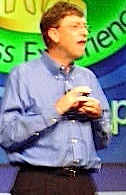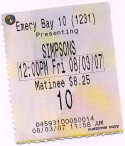
|
|||||||||||||||||||||||||||||||||||||||||||||||||||||||||||||||||||||||||||||||||||||||||||||||||||||||||||||||
Flickr: "Our long national nightmare is over." Twitter Blocks is the kind of thing that demos well at conferences. Not too useful in real life.
Economist on who's afraid of Google. another senior bush staffer leaves. something terrible must be coming?? dan mactough *convincingly* argues that "expanded" does not belong in opml 2.0. apple to sell ringtones. excuse me while i yawwwwn. sugarattack says twitter is losing posts. i noticed that too. imho they ought to use some of the $5 million to make it reliable. I'm going to cross-post my tweets here until i notice that it's stopped losing them. noticed that some MSM podcasts are not bothering with the length att on enclosures. not happy about this. :-( Proposal for 'expanded' attribute in OPML 2.0. Important for people developing in-browser apps that use OPML. Dan MacTough offers a compelling argument for not including "expanded" in the core spec. (I fixed the typos, and reworded the last two sentences per another suggestion, here.) Michael Markman on the "perfect storm" around Scoble this week. Nathan Rein on computer-free micropodcasting. Good idea. TechCrunch on new features for Twitter today.
Remember the Social Camera? It exists!
In tomorrow's NY TImes, David Pogue reviews the Fujifilm Z10fd. "It's one of several current Fujifilm cameras with an inconspicuous infrared lens on the side. You can hold the cameras up to eight inches apart, lenses facing. Then, with three button presses, you can beam a full-resolution photo from one into the other. Thanks to a new, high-speed infrared standard called IRSimple -- the first serious update to infrared beaming technology since the old PalmPilot days -- the transfer takes only three seconds." Help send Uncov to TechCrunch 20 I just gave $100 to help send the kids at Uncov to the TechCrunch 20 conference later this month. They still need more than $2000 to pay for their ticket.
I got the closing quote in the story, and it's a good one, an observation I'm proud of. I'm also happy with the way it was said. It was transcribed perfectly, because copy/paste is error-free, where a reporter grabbing soundbites in a phone interview is likely to make mistakes. Here's the quote. "It may not be obvious, but Netflix is a social network, and the more the networks open and let the user's data be portable, the more power it gives developers to do interesting things with the data," Winer wrote. "Netflix has always had a great attitude about customers. It would make sense for them to be the first to trust us with our own data." I stopped doing interviews about a year ago. As a result, I haven't gotten quoted as often as I used to, but I'd prefer to not be quoted than to be quoted saying something stupid, dishonest or wrong. The reporter's filters really get in the way. Their assumption that everyone they interview is selling something, or lying to them, or hiding the truth really screws up the process. Also, I like the quote beacuse it shows that interesting stuff happened at Gnomedex that wasn't about you-know-who. PS: Mike at Hacking Netflix was misquoted in Salon after a phone interview. It was a big misquote (he said he waited for Netflix for 3 months, they quoted him as saying he waited for Blockbuster). And how ironic that Mike misquoted me, saying that I do interviews only email. I didn't say that and I never do interviews by email.
The title of this piece "We fact check your ass" was a synthesis from the early days of blogging. There are a few key ideas about blogging in that short phrase. 1. There are many of us. 2. We care about the truth. 3. We use colorful language. So this leads to a bunch of good blogger behavior, stuff Scoble knows about, stuff Scoble has evangelized. A person who puts his ideas out there takes the risk of putting out incorrect ideas, but that's not a problem if there are lots of people fact checking his or her ass. So here's what you should do when you say something that's incorrect. As soon as you realize it, correct it. Maybe offer an explanation, but that seems optional. But first and foremost, fix the bug. Everyone is telling him this, but he's not getting the message. Simply say "I made a mistake" and every piece from this point on won't have to guess what happened. PS: TwitterGram explaining this in my own voice. PPS: Wired piece posted late yesterday.
I provided in response to a request from Don Hopkins, a rigorous definition of flatdown. Actual C source code is provided. I also defined the other outline processing directions -- up, down, left, right, flatup and nodirection, even though Don didn't request those (and they're not mentioned in the spec). I uploaded a copy of the C source code of the OPML Editor in a form that will be better indexed by search engines, so that future queries about the internal workings of outliners can be addressed by searching the source. It's licensed under the GPL, and build instructions using XCode are provided (as are build files for a variety of popular development environments). I don't generally support this technology, I wrote much of the code but it was a very long time ago, and my memory isn't so good anymore. But surprisingly, a lot of it came back. Don Park wants to extend OPML using a wiki. Not sure I understand how this works, but he says it doesn't involve changing the spec (thanks!) so it's no problem for me. I'll watch and see how it develops. PS: Possibly the coolest thing made possible by today's changes is the ability to embed OPML 2.0 data in RSS 2.0 feeds. Another day with more work on the OPML 2.0 spec. Yesterday I provided some examples of OPML files that use the category attribute. A reminder to people working on OPML apps, I have a beta of a validator that tests against the 2.0 spec. Here's an example call, the validator being used to check the current OPML file for Scripting News. Also I've seen some comments recently that say that the spec isn't very good. If you have concerns about the spec, please let me know what they are, now, while errors and omissions can be fixed. Thanks. Here's an RSS 2.0 feed with an item that contains several outlines, basically the show notes for a podcast. You might have to View Source to see what's going on. It's like chocolate and peanut butter. Both flavors are tasty, but when you put them together, it's even yummier!
One of the questions came from Randy Morin, who wants to see examples of the category attribute. I did a little digging in the archive of this blog from late 2003 when I was working on a tool I called Channel Z, that was all about routing stuff from outlines to various buckets that would accumulate content over time. Here's an example of an OPML file from December 2003, when I was actively exploring this stuff.. And while the dynamic site that was "aggregating" all this categorized content is long gone, archive.org is doing a good job of preserving it. Here's the RSS category, one that I posted to a lot. You can navigate using the links at the top of the page.
I think synching is a bad idea, but Apple's mobile technology is built around it. I dislike synching. I want my devices to go straight to the cloud, both ways. My podcast player should have a built-in podcatcher. And my podcast recorder should also be a publisher. Seems unlikely that Google's phone will depend on synching. It will be more Dave Winer-compatible than the iPhone is. But the iPhone is pretty cool when you tether it to Twitter through Flickr. Yeah. I realized earlier today that I have a pretty good bag of tricks for Twitter and Flickr. I may just package em up and give em away. You'll have to run your own server if you want to access it over the net.
1. Google is not going to replaced as the #1 search engine anytime soon. It's a simple application of Ries & Trout. There's a ladder in search, as in all product categories. Google is so firmly installed in the top rung of the search ladder it's hard to even think who #2 and #3 are. (That is, if Google is Coke, who is Pepsi?) 2. Spam has not had a major impact on the usability of Google. I'm sure they're investing huge resources in detecting and eliminating spam from their index, it's such a core issue for them. 3. Search is like a desktop operating system. You can translate a dominant position in search into dominant positions in almost any other product category. There were lots of startups poised to kill Windows in the 80s and 90s. None of them had any impact on Windows, which was a juggernaut, as Google is a juggernaut today.
1. Scoble, if the Mahalo proposition to authors is so attractive, have you signed up? Which pages on the Mahalo site are you maintaining? What's it like being a Mahalo author? 2. It's ridiculous to think that TechMeme is spam-resistant where Google is not. Both are algorithmic. While Gabe Rivera is a very smart and hard-working guy, they have plenty of smart people at Google. 3. You might have a case with Facebook. When I'm searching for something and can't find it on Google, I often ask the readers of my blog for help. Sometimes it's hard to formulate the query. The people who read my site are smart and like to show off. I think the same thing is happening on Facebook. If you can't find something, ask your network. That might go. 4. The idea that Facebook is an Internet within the Internet, something Time said today, that probably is a big threat to Google. I think you weakened your story by dragging Mahalo and TechMeme into it. The reason Facebook is interesting is that unlike Google it's built on identity, it's built on everyone being identified, and people having one identity (although it's certainly possible to have more than one, it might be hard to get a lot of people to recognize that identity, people with a lot of "friends" may be more trustworthy than people with very few). Facebook may be on a different ladder than Google is. I'm sure Google is all over this from every possible angle, so we'll find out shortly. PS: Rand Fishkin steps through Scoble's piece. PPS: The champion of the Internet in the battle against spam is using spam to promote his own product. Are there any third party headphones for iPhones? I can't find the disk that came with the Airport Extreme. Is there a place I can download the disk from? Gartenberg: "Why is nytimesriver.com so much better than mobile.nytimes.com?" A very nice piece, hope you read it, but he got one fact wrong. I just made the river site so I could read the news on my Blackberry. I didn't know about the official mobile Times site, because it hadn't yet been announced. They came out within days of each other, so it's understandable that the author thinks nytimesriver was a response, but it wasn't.
Twitter makes Flickr more useful I've finally got the bugs worked out of the Flickr-to-Twitter agent (knock wood). I now feel confident as a user that when I post a picture to Flickr it won't unleash a torrent of old Flickrs on my unsuspecting Twitter followers (up to 1900 now). Because of that, I'm willing to use the feature more often.
This is one of those rare moments, when something works, and now my use of computers reaches a plateau that makes total sense. I call this feeling Living In The Future. It's the nicest feeling technology can deliver, and it's one important reason I like playing with these toys. The other reason it's a significant futuristic feeling is that to make this work, I needed to use two web services, from two companies. Because they support standard technologies (email and RSS) and have blazed new trails (Twitter's API) a mere user (me) can bridge the two in a couple of hours as a proof of concept, and fairly debug it in a couple of weeks. In other words something is working on a broader level. These two companies are to be applauded, and encouraged to find more ways to help users make themselves happy. And look at how the newcomer, Twitter, made the old standby, Flickr, so much more useful. Now I have a way to link a network that I've already created into something cool on Flickr. And as a benefit, Flickr has a discussion feature, so it provides an easy way for me to get to know people who are subscribed on Twitter, and of course for them to get to know each other. All around good show, lots of win-wins, technology working for people. New: If you want to see the pictures of all Flickr-to-Twitter users, follow this Twitter account. Easy 'tinyurl' for OPML Editor users A script for the "custom" menu in the OPML Editor. Scanned page from AT&T phone bill Click the pic to see the bill page.
Login here: http://my.nytimes.com/ Screen shot of the home page, uncustomized. A press release ran at 9:30AM Pacific. According to this blog post it was open to the public on Tuesday at 9:38PM. I added Scripting News, but it doesn't seem to show up. Of course I'm still looking for a reverse-chronologic list of all new stories as they are published (as they appear in a Times RSS feed). Is there a mobile version of my.nytimes.com? What Scripting News looks like in the Times environment. Their answer to What is RSS? gets the Dave Winer Political Correctness Seal of Approval. Good job. I'm sure they handle all kinds of feeds perfectly well, no need to bother the poor user with technical arcania. Obvious opportunity to kiss up to influential bloggers missed. Only Battelle's site is in the list of defaults. Markoff likes Joi Ito. Engadget gets a link, TechCrunch does not. Of course Scripting News is linked in nowhere, but I didn't expect it would be. (Also, they clearly didn't seed any bloggers with the beta since it's been open to the public for about 44 hours at this writing and there's almost no coverage in the tech blog-o-s'fear. You'd think the Times could do better PR.) So with the disclaimers out of the way, you may take the following with a grain of salt... Initial impression: No big deal. They haven't improved RSS news reading in any obvious way. Looking for the reason to use this service, coming up empty. A couple of generations behind Google Reader.
Other reviews: Blodget, Mashable, MacManus. Please read this sentence. FINISHED FILES ARE THE RE- SULT OF YEARS OF SCIENTIF- IC STUDY COMBINED WITH THE EXPERIENCE OF YEARS. Count the F's. How many did you find? Click here to see the answer. Thanks to Don Brown for forwarding this. It's a great puzzle! Click the pic for an explanation. Yesterday I caught up on cable news -- hadn't been paying much attention. I was peripherally aware that there had been a mine disaster in Utah, followed by a cave-in while rescuers were searching for survivors. Some of them were lost too. The owner of the mine, a fat not very pretty older man, had become a media star, and had said something in the last news cycle that the press had latched onto, and now talking heads were saying nasty shit about him, the kind of stuff they never say about politicians or TV anchors, the stuff they reserve for the powerless, death row inmates, Don Imus.
The thing is, why we need to be paying attention to this in the blogosphere, is that we're doing the same thing, all the time. We have all the trappings, the cameras, the mikes, the beautiful interviewers. And we make big deals out of little ones, and let crooks off the hook. We haven't started any real wars yet, but give us time, we're just getting warmed up. And maybe if we are somewhat aware of this, we can try to offset it with a little bit of humanity. Maybe someone can speak up for the poor schnook who gets caught in the gears of the blogger's fear. (Sorry for the pun.) Solution to Don's Amazing Puzzle There are six F's in the sentence. There is no catch. I found three. I went back and counted and recounted, and I was sure there were just three. So I wrote a script to see what was going on. It said there are six! Mystifying. Here's a screen shot of the script. I first ran it in DaveNet in 1997. It's usually fun. Only two people I knew back then got it right without any coaching. My uncle and Scott Rosenberg. Scott said his trick was to read the sentence backwards, something he learned as an editor at Salon. My uncle was an engineer at heart and loved puzzles. He just did what the puzzle told him to do, literally. Most people, myself included, don't. That's why it's an amazing puzzle. It teaches us about our ability to see what's right before our eyes. Don't feel bad if you got it wrong, you have a lot of company.
Anatomy of a Flickr photo (its metadata)
Today I wrote a glue script for Flickr.photos.getInfo, which returns a table of structured information about the picture. It's a fascinating piece of metadata, and something a lot of people should look at, but I don't imagine too many have, because it's buried under so layers of code. So I took a snapshot of the metadata for a picture that I took at BarCamp last weekend. The page is not dynamic, so if notes or tags get added, the snapshot won't change. More: The data from flickr.photos.getSizes for the same pic. PS: The table was generated from an age-old Frontier macro that I had a lot of trouble locating. More and more I'm posting my daily links on Twitter. There may be a way to synch up with the website, I'll think about it, but in the meantime, you may want to join Twitter and subscribe, or subscribe to the feed in a RSS reader.
I just read the comments on Chris's post, they're pretty interesting. Of course I also ready Chris's post. Not sure what to make of it, and maybe I don't have to draw any conclusions. It's his conference, he gets to decide where it goes, it's an expression of his values, what he thinks is important. I never questioned that. But whether I'm part of that will be a function of where he decides to take it, and that's my choice to make. I place a very high value on discourse. The idea of sitting in a dark room with 300 other people listening to someone say nothing for 1 hour really bothers me. In my mind I start multiplying, figuring out how much time is being wasted, and how much better it could be used. Think of all the ideas locked up in all those brains. Is this the best we can do? To me, this year's Gnomedex was the kind of conference I was talking about in my What is an Unconference piece. I know we can do much better, I've seen it done, by the participants in the four BloggerCons. I saw it done at BarCamp last weekend in Palo Alto. I saw it in the hallways at Gnomedex, some of those conversations were so juicy, everyone should have heard them. Many of them were much more interesting than what was being talked about on stage.
Scott Rosenberg: "Gnomedex is no more exempt from the laws of public speaking than any other conference: If a keynote speaker can't be bothered to prepare a cogent talk, the audience has a right to its disgruntlement."
The first time I got bad news about a product was when I asked a friend to use the software I was working on. He wasn't a programmer, he had never used a computer. An educated intelligent person, roughly my age. (When I was young, believe it or not, there were many people who had never used a computer.) Before he had fully settled in I knew it wasn't going to work. I was able to play out, in my mind, what was about to happen. The software would say nothing to him, so how could he know what to do. I waited and what I predicted did happen. He looked at me and asked "What do I do now?"
If you want to make a product that people use then you have to pay attention to their experience when they use it. The better you are at understanding, the better your product will become over time. The inverse is true as well. If you deny the value of feedback, or deflect it, your product will never get better.
More specifically it's a blogosphere user's conference. Tech companies may sponsor the show, but they are largely observers. When the discussion on stage is focused on blogs the people presenting often are users. And that's the thing I like about Gnomedex. When you put vendors on stage, they have to get their money's worth, it's their job. I know because I've spoken at many conferences as a vendor. It's always a struggle, the temptation to sell, balanced against the audience's right to get value for their money. Which brings me to another thing that's fairly unique about Gnomedex. Most of the attendees pay to be there, unlike most tech conferences where almost no one pays. At Gnomedex, the tradition is so strong that even though I've spoken at two of the three shows I've been to, I've always paid for my ticket. It may be be out of personal loyalty to Chris and Ponzi, or knowing that it's not a big corporation putting on the show, not sure what it is but it never occurs to me to ask for a comp. This is a good thing, btw -- because its made it inappropriate for people to give commercials from the stage and kept the focus firmly on the users' interests. There are plenty of tech conferences where sponsors take the stage and pitch their products. At least there you're not paying to listen to an ad. Let there be at least one conference that is about users. But this year, the program wandered off-topic too much, imho. Too many of the speeches were about politics, the speakers were intolerant of discussions, and in two cases even questions were not appropriate. Someone has to say something about this, and surprisingly very few people have. The opening keynote speaker, Robert Steele, was a total disaster, completely inappropriate, insulting to our intelligence, and way off-topic. He rushed through his complex slides, strung together countless buzzphrases into non-sentences, never completed a thought, and made it clear he wasn't even taking questions, much less disagreement (and how could you disagree with a presentation that never bothers to make a point). The guy looked and sounded like a poor man's Rush Limbaugh. I thought for a while maybe he was a joke, a parody, a comedian, but you don't make your opening speaker of a conference you care about a joke. The presentation on Open Money was equally confusing and insulting, the speaker refused to even define the concept. And in the end, after supposedly explaining a revolutionary system of finance, he had the gall to ask us for the old kind of money that he was theoretically finished with. It was laughable.
It's fine to have one off-topic speaker, a retired politician, a Nobel laureate, a sports hero, maybe an astronaut or former president. But not as a keynote, and not so many, and not such flakes. We are worth it. I don't think Chris gets that. A lot of accomplished people would like to present their ideas to the people who come to Gnomedex. If Gnomedex is to continue, it must get back on track, it must reflect our interests, the audience's interests. Chris is a great entertainer, and a warm human being, but his vision of the political and economic future is not something I share, or would find interesting to discuss. Chris may choose to run a conference about his political views, but I have a choice too, when I go to political conferences, they reflect my interests. I go to Gnomedex to meet other bloggers and discuss what's happening in the blogosphere. It shouldn't be hard to program that, we can help, if asked. If you have comments, please post them here. Tris Hussey defends Gnomedex, questions my honesty and value as a human. Sad. :-( On 8/12 I wrote about the things that worked at Gnomedex. I've been talking with Scoble about GD. He approves of this critique.
I've been staring at the docs for the Flickr API and can't find a way to loop over all my pictures. I must be missing something obvious. I found flickr.photos.getNotInSet, that returns a list of photos that are not part of a set. That will possibly be helpful. Not sure what the format of a "unix timestamp" is. If anyone has an idea, please post a comment here. Zach Beane has a clue. Use the search verb, look for nothing. Loop over the pages of results. Sounds good. Richer namespaces for Twitter? As Twitter evolves, maybe the URLs will get longer? Imagine what might go at: http://twitter.com/davewiner/gnomedex All twits that I post while at Gnomedex? If you follow that URL, when Gnomedex is over, the subscription goes away. Just an idea. There's a lot of detail that could be added to what now is a very simple namespace. New feature today, Google maps can be embedded in pages the same way YouTube videos can. Here's an example page. This is going to be very useful for conference websites, restaurants, bowling alleys, Craig's List ads.
Podcast: Open identity in 2007
Here's the 1/2 hour podcast. Dan Farber asked me to summarize, I suppose that's all right. I don't do many podcasts these days. I did this one because I want people to listen. These are relatively complex economic and political issues, and simple thinking won't yield useful answers. But I will try to summarize anyway. 1. Brad is absolutlely right, many people are tired of entering the same relationship information for lots of different social networks. I am one of those people. Maybe you are too. Maintaining this information is even more problematic, that's why we tend to use one "current" social network, and leave a trail of moribund networks behind us. 2. The more tired we get, the more demand there will be for a single resource that allows people to establish and maintain these relationships, and use them in a wide variety of different applications. 3. While Facebook, admirably, takes risks with users' data, the users are a lot more conservative than we techies might like them to be. Wishing it weren't so won't change the way they feel. 4. There are enormous economic incentives for companies that run social networks to not let users of other networks access their services. Shareholder value is a function of how many users they have, how they are "monetized" and how hard it is to switch. The harder it is to switch, the more money each user is worth. Any exec that did anything to decrease the number of users they control would probably be fired. So anything that depends on this isn't very likely to happen, in existing networks. 5. However, a network that, from Day One, allows users of other networks to participate, and allows developers to access user's data, with the user's permission, but without permission from the network, may become the www of open identity systems. As much as it is considered politically incorrect in the tech world to say this, don't bet on OpenID being that network. You would have gotten roasted in 1991 for saying OpenDoc wasn't the future, but it wasn't. For the same reasons OpenID isn't. Now if you want to understand why all these things are true, give me 1/2 hour of your time, listen to the podcast. Take it for a walk, or take it with you on your commute. If you're interested in the future of web technology, I think it'll be worth the time. Adriana Lukas: Users do not stand still. I ran into Tom Conrad of Pandora at BarCampBlock yesterday in Palo Alto and he volunteered that he was at Gnomedex earlier this month, and from his point of view what happened during Jason Calacanis's presentation wasn't that big a deal. I asked him to explain and he told me the story, which he repeats in a blog post this afternoon. I totally appreciate that Tom was willing to speak up. Thanks Tom, I won't forget it. Aidan Henry sees it as I did, but I missed his post when it appeared a week ago. "Gnomedex presentations are meant to spur discussions and conversations around trends, standards, principles, ideas, and concepts -- not specific companies." RIch Skrenta who knows SEO, reviews Mahalo. Fast Company: "As a kid, he was tossed out of school for fighting and mopped blood off the floor of his father's bar; his mother, an emergency-room nurse, would stitch up the combatants at a local hospital." Elaborating on yesterday's post about video cameras... I think it's silly for a group of people in a garage in Palo Alto to think somehow there's something significant about them standing in the garage on a Sunday morning listening to a talk about the history of the place. It's a nice place to be if everyone is acting like a normal person, not like a TV star. But with three video cameras running, one a big professional rig (it seems to me) people are exaggerating what they say. As I talk, I wonder which soundbite is going to appear on the blog everyone points to tomorrow. My mind moves away from the garage, out into the future, and I want to get the fuck out of there as fast as I can.
All this is a roundabout way of saying that with so much seriousness, having to be so careful so much of the time, maybe people can understand why in the future we may think the greatest luxury is to be so far away from video cameras that our words won't be recorded, so we can just be dorky shlubby nobodies whose words would seem foolish if the wrong people were listening, even if just for a short while. I got a chance on Twitter the other day that I don't think Godwin's Law is funny, esp in the times we live in. Its assumption is that things never get so serious as to justify a comparison to the most famous fascist regime in recent history. But Godwin's Law is cruel because there are still survivors of the Nazis alive today, and it cuts off their using the Internet to teach. And their children are very much still alive. You may want us to forget, but Jews will never forget what happened there.
Pictures from BarCamp in Palo Alto In reverse-chronologic order... Newton Chan, professor, Foothill College. Don Park, telling it like it is. The house the HP garage is behind. Heather Harde, TechCrunch CEO. Scott Beale & Lane Hartwell, schmoozing. Sarah Meyers, video journalist. Why I don't like all the video cameras
But today it's nothing like that, and the everyday papparazzi are proving it. The video cameras are so cheap and so are Internet connections, we're heading to a place where even the most casual of encounters may be captured and broadcast. I want to live a more ordinary life, not one where I feel like a celebrity. People already expect too much of me, I never seem to live up to their expectations, that's because they think I'm running for office or want them to buy my record or watch my TV show. I want none of that. Mostly I want to just be a normal schlub, sitting in the audience, maybe contributing something once in a while, and publishing my art on the Internet, for my own pleasure, and that of anyone who happens to be looking in. Why mention this now? Why should you care? Because soon you're going to have to decide whether you're a celebrity or a schlub. And you may not have a choice but be a celebrity. My request: If you point a camera at someone, ask for permission before you start recording, and if they say no, don't turn it on, smile and say "No problem."
Journalism is the new Catholic Church
It seems journalism is the new Catholic Church. Without the savior. Imho, the pros are right to be worried. It's the last quarter of a game they're losing, and the opposing team is deep in their territory. They need to get the ball back and then connect on a few Hail Marys to even be in the game. Yet all they do is weakly protest that "this isn't journalism." We need information. To say it's not journalism now is like a priest saying it's not Catholic to a bunch of agnostics. You're answering a question no one is asking. A news story should summarize points of view that are available in full on the newspaper website. The newspapers should try to host the blogs of the people they quote. Instead they cling to the fiction that they have the exclusive wisdom to decide which soundbites and points of view are relevant, and the reader needs nothing more than what they provide. This is wrong, the world is too complicated, and the resources of news organizations are shrinking and our appetite for information is exploding (and the tools for creating and using news are getting better all the time). If a reader wants to find out what's really going on they have to search thoroughly for many views of the same event and try to piece it together. The first news organization that embraces that view wins. Google is taking first steps to be that news organization.
I'm beginning to think it's already too late. Too many people rooted too deeply in the past to take a chance on the obvious future. Oh well. Happy Friday! Chris Double blogs on my visit to Mozilla yesterday. Kevin O'Keefe: "Gnomedex is about open discussion." Scoble interviews Marc Canter. "Life is good." TorrentFreak reports that Comcast is throttling BitTorrent. Tom Morris: "I’m getting fed up of the blogosphere taking every critical remark as an 'attack' on a person." Amen. A bootstrap begins with a lot of typing
So I drank a cup of coffee, turned on some music, and in about an hour copied all the reviews (over 300) into a text file, organized by the number of stars I gave a movie. It was actually an interesting exercise, I changed the ratings of some movies, and thought of movies I hadn't rated that should be included. I think a good user interface for a new collaborative rating service would be something like Hot Or Not, where you get the name of a movie, a picture of some kind, a one paragraph synopsis, and a chance to rate it with 5, 4, 3, 2 or 1 stars. Of course it would link to a page where you could rent the movie, read reviews, or write one yourself. One thing this project is going to need, clearly, is a web service that takes the name of a movie and a year, and returns a globally unique identifier, preferrably the address of a web page with information about the movie. AP: "The Federal Reserve approved a half-percentage point cut in its discount rate on loans to banks Friday, a dramatic move designed to stabilize financial markets roiled by a widening credit crisis." This was a surprise. Now we find out if the market comes out of its downward spiral. This topic has to be addressed from time to time, just to keep my head above water and make sure everyone, friends and others, know where my lines are. In the mess with Jason Calacanis, the subject of friendship kept coming up on his blog, and here as well. It seems that Jason and others expect something special because we're friends. But there are several kinds of friends, it seems,. At times I wanted there to be just one kind, but eventually I threw in the towel and started, along with eveyrone else, using the term several ways. First, there are real life friends. People who you commit to being intimate with, for a lifetime. Sure, they come and go, that's unavoidable -- people move away, people die -- but the intention is that we're going to share big chunks of our lives with each other, and trust each other to tell our whole truth. These are people who come visit you in the hospital when you look and feel like shit, they help you feel a little better. And vice versa. They're people you apologize to openly and fully when you fuck up. They're people you trust to see your darkness and lightness, knowing they won't abuse the trust. You can't have a lot of people who are friends in this way, if you dilute it too much, it stops being meaningful. Now it's possible to have simple affection without the trust, and that can be called friendship too. People you see once in a while, or go 20 years without seeing, who you truly like, and are happy to see, who shared something good at some point, and you hope to share something good again. And then there are the business relationships that are called friends. Just now on CNBC, I heard a banker say that another banker was a friend. I imagine that means they have dinner from time to time, speak well of each other, maybe exchange favors. These are also friends. It's in that sense that Calacanis and I were friends, along with many other people.
Now -- the big question -- which I have an answer to, btw, is do any of these kinds of friendships create a an obligation that you won't be openly critical of the person's work? I say no, because then you have to question your friend's motives, and who wants a friendship to be like that. Is this person choosing to be your friend so that you won't be able to criticize their product or employer? So that you'll only say positive things about their work? So, for example, I can be critical of Feedster, and Betsy Devine will still be my friend (she worked for them at one time). Yet, I feel compelled, when writing about a friend's efforts, to not only disclose the friendship (that's reasonable of course, it protects the reader) but also say that I really like the person I'm writing about, as if I would use this space to hurt them. I feel like a real chump when I do that, but given the atmosphere of the blogging world, I often feel compelled to do it anyway, so as not to start gossip that "Dave doesn't like so and so anymore." A real friend, who knew me, would know that I would never intentionally use Scripting News that way, but there are readers who don't know and some who pretend they don't know. A sure way to become a former friend, is to say that I have an obligation to express my opinion privately. That was one of the most offensive things Calacanis said. Had his demo been private, and under non-disclosure, if it would have been inappropriate for me to write something positive about the product, then I could understand his concern. But I have written about his product before, publicly. I didn't plan to write anything about more about it, but there I was at a conference, and he was explaining it, and I had a very strong reaction. When I'm exposed to something that's wrong, you can count on me to say so. Without that, this blog is nothing. And I don't sell anyone the right to tell me what I can and can't write about. And friendship is the worst excuse possible to say why I shouldn't write something. This supposed friend knows nothing about me if they think that will do anything other than provoke a very strong response of independence. I mention this not only in an effort to close the book on Calacanis (who btw could do this much more quickly by simply retracting the things he said that crossed the line), but also to lay the groundwork for me to write about Gnomedex. See, Ponzi and Chris are friends, and I have an idea that what I think of the conference could hurt their feelings. And as a friend, more of the personal kind than the business kind, I don't want to hurt their feelings. But, on the other hand, it is an industry event that I paid to go to. I don't go to very many conferences, and as it stands I will not go to Gnomedex next year. I'm sure some people will applaud this, and that's fine. Enjoy. But I have more to say about this, and I plan to. I just wanted to talk about friendship first.
Wired: See Who's Editing Wikipedia. Dave Sifry is out at Technorati, John Furrier is out at PodTech. Wonder who's next? Anne Zelenka suggests using Twitter for "people-powered search." I tend to use Scripting News. Ted at Uncov explains why he doesn't have "the sunshine-up-your-ass San Francisco world view." Great free wifi in the lobby of the Stanford Park Hotel in Menlo Park. Today I got a brief note from Jason Calacanis requesting that I not mention him on my weblog. This requires a public response. The answer is no. Jason, you just crossed a sacred line. I decide what belongs on this blog. If I worked for you I would resign, just like the editor of PC World did, when they tried to control his editorial. Geez, I hope you don't do this to the editorial people who work for Mahalo. Andrew Badera has a fair response to undue pressure. The PC World editor resigned over an article entitled Ten Things We Hate About Apple. Management relented and the article ran.
Today's talk came about from a random meeting with Brendan Eich at a party early this year. I had heard him once on a Gillmor Gang podcast, and found our philosophies more or less match. Given recent experience I'm going to try not to be too critical, but I've been encouraged to be honest and direct. Yes, imho they have made some mistakes with RSS, but there are some really big opportunities here too. BTW, if you're in the room at Mozilla, reading this, please cough three times so I know you're here. The topics of discussion at Mozilla
I am in favor of both #1 and #2. I'll explain more about this tomorrow. There are two sides to every story A few years ago, along with a bunch of other bloggers, I was invited to a Microsoft event to discuss their search engine. Having been to many such Microsoft events in the past, I thought the format was they would talk, and then we would talk, and then they would talk and we'd talk and so on. So when it came our turn, I gave them a lot of ideas, I thought that most of them were pretty good, but even if they weren't, my intention was to help them.
If I had it to do over again, knowing how they were going to use this against me, I wouldn't have even gone. They didn't pay me to give them my ideas. Such consulting would usually bill for $10K or even $25K a day. I didn't ask for any money. That was a mistake too, because I've learned big companies don't value things they get for nothing. However, my experience with Microsoft up till then was that it was a very expressive culture. I had been in meetings with execs at the company where they talk, very loudly and personally, for very long periods of time. Often at each other. Often angrily. The culture is led by two fairly angry people, Bill and Steve. I never minded this, btw. Being from NY, I like it when people are direct and tell you what they think. Much better than the west coast way, where you often have to guess.
For me the events are long-gone, but now, whenever someone has a complaint about me, whether justified or not, someone from that group, maybe someone who isn't even at Microsoft anymore, sends a back-channel message, and all of a sudden it's a big issue again. It happened this week with the Calacanis incident, another "event" that's probably going to haunt me for the rest of my days. (Thanks Jason.) Anyway, the headline is my point. Really, in this case, they should have said something up front. "Our culture has changed, and now we would appreciate it if you sit in the room and say nothing and listen to our talk. When it's done, you may ask questions, or tell us how much you like it. Then we will feed you and you may go home." Had they said that, I would have just left, because that's not what I do. Now, since this is my blog, and the rules are that I say what I think here, let me say that there's something really obnoxious about a culture that penalizes people for trying to help them.
I'd like to be able to subscribe to bundles of users.
Use-case #2. Say I'd like to see what it's like to be someone famous for a day or two. So I would say "Subscribe me to all of Steve Jobs's friends." Then I'd see what Larry Ellison, Al Gore and Bill Campbell were doing. Then when I wanted to see the world through someone else's eyes, I'd unsub from Steve's friends and sub to all their friends.
Obviously this feature would work for any news-oriented social network. Originally I proposed it for RSS, they were called "reading lists," but I couldn't get the community of reader developers to implement the feature. I did implement reading lists for the NewsRiver aggregator that's built into the OPML Editor. Maybe the time is right, in the developing social networks, which are very much like the world of RSS. I'd like to experiment with this. I wonder if it's possible to add it using the Twitter API. I'll have to think about it. Any thoughts are welcome. Post a comment here. Finding your own statuses in Facebook Bizzle found a Facebook "feed of my own status updates." Here's my own feed, and a screen shot of where it's located. As you can see I haven't been using Facebook very much. What becomes possible with this? Well, you could write a bridge app that allows you to use Facebook to enter status messages to Twitter, for example. This is the opposite direction from the one Fred Wilson wants. Jeff Sandquist: How to publish your Facebook status to Twitter. Atom is not better and users don't care
Everything would be okay if they didn't push it so hard. Remember that users don't care. Edit all docs and specs accordingly. Everywhere it says "Atom is better" remember "Users don't care." Facebook is doing the same thing, and I'm pulling back from endorsing them until they take the religion out of their docs. I won't help propogate the myth that one format is better than the other. Users don't care. If you must answer the question "What's the difference between RSS and Atom?" just say they're different flavors of the same thing. Even better would be to find a way to avoid raising the question at all. Test your reader against all formats with significant installed bases, and do what you can to keep the number of formats to a minimum. That's not only my advice, it's also Jon Postel's. Further: If people want to debate the merits of one flavor over another, fine, but the discussion should be banished from all places that are visible to users (users don't care). I like chocolate, and someone else likes pistachio or butter pecan. But all are cold and sweet and desserts. The argument should stop when it gets to the qualities of the people who like one flavor over another. "People who like cheddar cheese are inherently better than people who like gouda." Now that's obviously silly. But when you look at some of the discsussions, esp things people say about me, that's what it comes down to. Dave is a bad person because his feed is RSS 2.0. That's when people tune out any discussions of progress as "syndication wars." That's how we get stuck. The Robustness Principle, also known as Postel's Law, appears in the spec for Transmission Control Protocol (TCP), edited by Jon Postel in 1981. There's a Wikipedia page on Postel's Law. Two events happened in Washington politics in the last couple of days that puzzled me: 1. Karl Rove, on his way out at the White House, said Hillary Clinton is a "a tough, tenacious, fatally flawed candidate;" and 2. Douglas Lute, our "war czar," said the option of restarting the draft was "on the table." I figured out why the czar said what he said -- it's the military, sending a message to the President, in clear terms. We can't keep running the way we're running, and if you won't do something about the shortfall of soldiers for the war in Iraq (really an occupation, of course) we'll take the issue to the people, in a way you'll feel. No doubt, even talk of a return to the draft changes things. I think it's a good idea to talk about it, and quite possibly a good idea to reinstate it. That would get us out of this mode of life-as-usual. We are losing in Iraq, pointlessly, and eventually we're going to have to leave. Yes, cut and run is looking like the right way to go, esp when the cut part could be explained as "cut our losses." Why Rove said what he said, though, is a total puzzle. I am uninspired by Clinton as a candidate, I think a vote for her is a vote for another four or eight years of not dealing with our problems, and she's the most Republican of the Democrats running. But Rove is no idiot, not about things like this, so he must figure that it would serve the Republicans if Hillary was the candidate, because that kind of hype really helps her. I found myself, inside, rallying behind Clinton because I so despise Rove. No kidding. So there must be some reason Rove thinks she'd be easier to beat than Edwards or Obama. Or maybe he's figured we all understand how his (twisted) mind works, and he's telling us this so we won't rally behind Clinton because secretly he knows she's the strongest Dem, and would much rather run against... Oh fuck it, this is pointless. While I applaud their first steps at exposing previously trapped data, they still have a long way to go. Fred Wilson, a user of and investor in Twitter, says he'll feel Facebook is open when he can use Twitter to update his Facebook status. It may require an agent to bridge the two systems, there doesn't seem to be much hope that they'll support identical APIs (though it's not too late for that), and at this time Facebook doesn't provide enough in the way of APIs to do this (please correct if wrong) while Twitter does.
So maybe Facebook is filled with visionaries who want to build on the work of others, but I'm pretty sure there are also people there who would be happy to hold things back so they don't have to work so hard. But don't worry, they have them at Google, and Yahoo, and Microsoft and Apple too. It's just the way things are done in the tech world. Ths isn't going to make me a lot of friends (something my friend Fred Wilson says he blogs for) but that's not why I blog.
I reported earlier on a new feed in Facebook, allowing notifications to be visible outside the wall. It's getting reallll interesting -- I've found some more RSS feeds in Facebook's UI. 1. Friends Status Updates. Look for the subscription link in the lower right corner. 2. Friends Posted Items. Again, look in the lower right corner. These are new, and I'm pretty sure more are coming. Of course the big question is How Far Will They Go? Do you all think that the apps we're building on top of Twitter will be able to run on the Facebook platform? I think there are a lot more users "over there." (I'm still very much centered in TwitterLand as I'm sure is obvious to anyone who's rooted in FaceBook.) TechCrunch coverage of this story. Jeff Sandquist: "I suspect this will allow me to send my Facebook status updates to Twitter." Paul Thompson: "The 'friends status updates' feed has been available for a while now." Geekspeaker says RSS may be the new HTML.
"Dave, I'm sorry I made it sound like you were the only person at Gnomedex talking back during my speech. In fact, the chatroom and Twitter were erupting, and people were talking in the audience, and you weren't even the first person to speak out loud. I'm also sorry for all the personal things I said about you, I have no insight into your personality, I'm still trying to figure myself out. At age 37, I haven't even had my mid-life crisis yet!" And he'd also apologize to Nick Denton. "Nick, I'm sorry I called you a 'fucking liar' on stage at Gnomedex. I think sometimes you stretch the truth, and maybe you actually lie, but I lie too, and I wouldn't like it if someone talked about me that way." And to Google. "To our friends at Google I'd like to apologize for saying that your search engine is filled with spam." And finally, he'd apologize to the people at Gnomedex. "To the people who came to Gnomedex, I realize that you took time off from work, and paid to attend the conference, and in many cases paid for your travel and hotel, in some cases thousands of dollars, only to hear an advertisement. That might have been okay if my talk weren't about the evils of advertising and how it was destroying the Internet we know and love. Boy was that ironic and I am really sorry for wasting so much of your time and money." Bonus 1: Wikipedia page and Google search for mensch. Bonus 2: Wired report on the Calacanis speech, just after it happened. Bonus 3: Dave W as viewed by Tim O and Jason C. Josh Bancroft: "Is the RSS feed for 'Your Notifications' in Facebook a new feature?" We're going to check it out Josh. Here's my notifications feed. I was able to subscribe to it in my aggregator, no problems. It's definitely getting my notifications out of the Facebook silo (assuming you can see it). Here's where you can find the feed. Wired quoted Calacanis quoting TIm O'Reilly saying some pretty nasty stuff, explaining why I'm not invited to his conferences. He wrote this piece in 2000. The problem with the O'Reilly piece is that is isn't true.
And Wired might want to check these things out before repeating such damaging attacks as fact. I think that's covered in Journalism 101. These mob attacks are fun for you guys, but they're not fun for the people who get ganged up on. Some people take advantage of that, and use it to build flow and page rank, and distract people from issues they don't want to talk about. Publications like Wired should be counted on to slow things down and check the facts. If we have more of that, we'll have less of the bad stuff. Jay Rosen on Karl Rove and Washington politics. Xeni Jardin reviews (new!) Virgin America airline.
Fantastic Holiday Inn commercial I saw this commercial in March, and have been looking for it ever since. A group of Dilberts is hanging out in a Holiday Inn, talking about a blogger they work with. I love driving my new car. It's fast. Feels strange to be home, to not be moving. But it's a nice house to come home to! First thing on my to-do list, figure out why the next-prev links broke as soon as I left home. (Update: They're fixed. Trivial bug.) Sylvia reviews Gnomedex and the main Seattle library.
That said, I have a lot of trouble believing that a street fighter from Brooklyn (I'm from Queens) is still having an emotional time with this. But some people are very sensitive, and I'm willing to believe, long enough to apologize, that Jason is still feeling emotional about being interrupted on Friday. However it could also be a tactic, an attempt to silence a critic. I've seen that done before too. Recently I objected to a piece written by Richard MacManus on ReadWriteWeb, where he characterized my posts about RSS as warfare. I asked him if there was a way I could write about RSS without it being warfare. Richard is a good guy, who I've met many times, and I know him to be thoughtful, and he had a thoughtful response. The answer is that I should be able to write about RSS without it being characterized as warfare. If the blogosphere is about anything, it's about discourse. So if someone has an opinion about a format or a product, not only are they allowed to express their opinion, it's actually encouraged. It seems this is part of our shared values. So we should be very careful about characterizing mere writing as somehow harmful, or war-like. Imagine if President Bush had written a series of blog posts about Saddam Hussein instead of starting a war. Wouldn't the world be better off if he had? (I know it's ridiculous, but I'm making a point). Writing freely is also an American value, not just a value of the blogosphere, it's right there in the Constitution. We are encouraged to speak our mind. And if I may be so bold, it's also a special value of people from New York. So if a boy from Brooklyn doesn't want a boy from Queens to write his ideas on a blog, well that's not a problem for the boy from Queens. I also offered, in a comment on the Wired blog, that Mike Arrington, the co-host of the TechCrunch 20 conference, has used exactly the same method as I use. When he's sitting in an audience and has trouble with something someone says, he says so. There were a number of people who did it during morning sessions at Gnomedex on Friday, and other people did it during Jason's talk, in fact I wasn't even the first one to speak out. So forgive me if I feel like I'm being used as a scapegoat. It seems Jason's problem isn't with my approach, or even me personally. It must be something else. Honestly I think I hit the nail in my post on Saturday. I think we ought to discuss his product, Mahalo, and see if we can't come up with a business that works for him and his investors, and for the blogging and podcasting world, maybe even for developers. If you read this blog you know that I'm into win-wins. I've been writing about it for many many years, and it's a sincere thing, I've backed the writing up with action. It's where XML-RPC and SOAP came from, where RSS and OPML came from, and believe it or not, its where blogging itself came from, something Jason has profited from enormously. I don't begrudge him that, but then he shouldn't begrudge my right to speak, even if I'm saying things he doesn't like. If I may quote from I a piece I wrote in 1996, after attending a conference where every speaker gave a talk like Jason's: "Here's an invitation to truly embrace the creativity of others. Instead of beating your breast about how great you are, try saying how great someone else is. Look for win-wins, make that your new religion. Establish a policy that nothing will be announced unless it can be shown that someone else will win because of what you're doing. How much happier we would be if instead of crippling each other with fear, we competed to empower each others' creativity." A lot of people read that, and it was widely quoted. I think in some ways this is the anthem of Web 2.0. It's our core shared value. If you can't find a way for other people to win with your product, then imho, you should keep looking. As I said on Saturday, no matter how much we may dislike or distrust Google, they found that sweet spot, and they haven't wandered off it. So when Jason launches his company with disrespect for Google, he's dissing us too, asking us to overlook a basic contradiction in his proposal. I think when he proposed to his investors he treated them with no more respect than he did us, but he probably couched the proposal in better terms. He must have told them they would make money, but if they look deeper, I think they'll find the same problem I found. And all the personal attacks can't hide that. On Saturday I resigned as an advisor to the TechCrunch 20 conference, but I'm not going to stop giving them advice. I think Jason should present Mahalo there, and let the reviewers take him apart. It'll be good for him and for his company, and maybe if he finds a good proposition, good for us too.
When you think of something serious like a bruhaha or kerfuffle in the blogosphere, remember this asshole. He's a friend of Scoble's. And if that doesn't make you smile, how about this quote... Winston Churchill: "In the morning, I shall be sober."
I had a great time at Gnomedex. Chris and Ponzi, as always, put on a classy show. It had its ups and downs, and emotional moments, and moments of great inspiration. I think Guy Kawasaki and Darren Barefoot gave the best talks. Derek Miller touched our hearts. People are talking about one presentation more than all the others mostly because the speaker is a great promoter, but the sparks also flew at a couple of other talks that aren't getting as much coverage.
I used some new technology at the show, my pictures flowed from iPhone to Flickr to Twitter, effortlessly, and pointed the way to the way publishing from a mobile device should work. I got pictures and text to flow in one package, and we have sound flowing in a separate stream. I want them to join, and I want the UI on the reader to be more enjoyable, but I'm satisfied that it works pretty damned well for August 2007. A heads-up on breakage. I broke the audio Twittergram functionality when I implemented the Flickr functionality, but that's fixed now, and you should be able to do audio posts again. And the Next-Prev links on Scripting News have been broken for a few days. I can't fix this problem from my laptop, but it'll be one of the first things I do when I get home. I'll be writing some tonight, and taking pictures through the day. It looks like the weather is good. Time to hit the road. Seeya later! Mark Smith: "The social side of movie watching definitely needs more exploration."
Scripting News is a proud sponsor of BarCampBlock on August 18-19, in Palo Alto, CA.
All these pics flowed through Twitter, using the new Flickr-to-Twitter mashup. It worked without a hitch, and was a big hit with my fellow twitheads. Not one complaint. My theory is that as long as the photos have titles, they are just like normal Twitter status messages with the benefit of having a visual image attached. People only complain when the pics all ahve the same title. This actually makes total sense. Now I want the whole package, a title, an image, and an opportunity to narrate verbally. My iPhone has all the capabilities I need, but I can't write the software. Open platforms will rule here. Jason didn't bring us a win-win
Yesterday, and in all his previous marketing, he rails against advertising and spam, which ironically, was exactly what he was doing to the environment at this mostly non-commercial conference. What we said (and I wasn't the only one speaking back to him, I wasn't even the first) was a response to this. It didn't come out of thin air. If he had given a similar speech to venture capitalists, if he offered them no way to win, they would have had the same response, but it probably wouldn't have been as patient or polite. Now, clearly he doesn't have the same respect for us that he has for VCs. But it seems that to some extent the success of his company depends on winning over the people here at Gnomedex. If it didn't, he should have stayed home, because his pitch, as delivered, doesn't work here, because he didn't offer us anything we want. We get a better deal from Google, believe it or not. Some of his argument against Google rings true, very few people love them as we did in their early days, but their proposition to web writers and podcasters is basically fair, it's a win-win. We get flow from them, they get ad revenue. They also offer us a way to put ads on our sites, so we can profit financially from the relationship. Nothing in Jason's pitch offers us anything like that. No flow, no money. And technically, it's not a platform, so we can't build on it. We're people, and we're smart, Jason, just like you, just like your investors. If you come making a pitch, there should be something for us, or it's not going to be well received. So there's a big bug in the concept behind his company and he tries to blow by it with an attack aimed at one person. That might convince really stupid people, but smart folk can see right through it.
His pitch here failed. He can't blame me for that. A good CEO goes back to the drawing board and figures out what works. I've known lots of successful CEOs, that's how they all work. I know many more CEOs of companies that failed, and they approach problems the way Jason is approaching this one. Ultimately, this is the act of friendship Jason is looking for. Now let's see if he has the maturity and will to succeed to let him see that. Scott Rosenberg: "The day that Google's results look like the flow of spam into your e-mail inbox is the day that people will start clamoring for something like Mahalo. But unless Google slips up badly, that looks unlikely."
Here's what bothers me about Mahalo
There's none of that with Mahalo. It's about Jason and his investors making money. Why should I care about that? It's like the iPhone. Very limited opportunities for us to be creative. Not my cup of tea. Calanis is ranting about marketers are intruding on the Internet. But explain to me how what he's doing is not an ad. Bold hypocrisy. He's spamming us right now. What a joke. I'm mostly sitting around listening to the conference speakers. Guy Kawasaki was awesome. He and I come from the same school of software. I agree with everything in his talk about evangelism. Other speakers were pretty good. The first speaker of the morning, Robert David Steele Vivas, was a Rush Limbaugh class idiot. I know Chris has some nutty libertarian ideas, I think he'll outgrow them eventually. But this guy was a total wacko choice to open the show. Me, I'm practicing silence. Just doing the hallway thing. Had a great talk with a guy from Netflix, as you know I want them to give the users control of their movie ratings. I think there's a chance they may do it. I'm using my Flickr-to-Twitter web service to take portraits of all kinds of Gnomesexers. You can see the latest in my Twitter stream or log directly onto Flickr. All of them are tagged with gnomedex07. Mike Arrington got sick. I think he's in the area, but is missed. There's a surprise planned for tomorrow evening. Can't say what it is. Live-blogging from Gnomedex. It just started and I'm already bored. Nothing to do with the conference, I love Chris and Ponzi, but conferences are so brutal. "Amazon is the hub of the world brain" -- says Robert David Steele Vivas. "Huh?" -- says Dave Winer. He mentioned Jello Biafra. He just called Karl Rove a Nazi. Hey I like this guy. World's most pissed off end user. "I gave up on Wikipedia because I don't have time to deal with morons."
I only have 10 invites for Round One. Anyone can register for the service, but only approved testers will be activated. I want to do this slowly. The service is going poll your Flickr RSS 2.0 feed quite frequently, so I want to see how much server bandwidth it's going to use. Update #1: Okay, I'm going to try to quickly add support for special tags, so that not every Flickr picture you upload ends up in your Twitter stream. This was the other Fred Wilson request, and other people are asking for it. Obviously it needs to be in there. First I have to figure out how Flickr adds them to the RSS feed. Update #2: The tag is there in the feed. But I gotta editorialize. Why did they invent their own category element instead of using the RSS 2.0 category element? Their new element appears to work exactly like the one they NIH'd. They didn't follow Postel's very good law there at Yahoo. No matter. I'm going to use it anyway. End of editorial.
Doc Searls remembers summer heat in New Jersey before air conditioning.
Gabe Rivera notes that Google News doesn't allow sites like Techmeme to crawl Google News, but they depend on other sites being open to make Google News possible. The news organizations should offer blogs to everyone who's quoted in their articles, btw. Should have done this a long long time ago (I suggested it to the NY Times in 2001 and to the SF Chron earlier this year). Instead Google does something lame, and beats the whole news industry. Some days it seems the whole world is built on cowardice and fear. TorrentFreak reports that Google filters torrents out of search results. This appears to be an article about RSS, in Hebrew. I added another user, Fred Wilson of A VC.
Now this new feature, and TwitterGrams, suggest that perhaps Twitter should have the concept of attachments for status messages, esp if they're posted through the API. There would be two parameters: 1. A content type, like image/jpeg or audio/mpeg. 2. The bits of the attachment. For a small set of types, Twitter would know how to display a "thumb" -- in the case of an image, it would be a tiny rendering of it. Click on the thumb to see the full picture. For MP3s, there would be an inline player. People are kind of repulsed by the urls I'm dropping into the feeds, on one hand, on the other, I'm getting a hundred new subscribers a day, so people are attracted to it in (much) greater numbers. Rich media in Twitter posts makes a lot of sense. A much prettier UI is possible, but this is something they have to do.
The Photos-to-Twitter experiment worked. Of course the first stop, Crater Lake, had very limited cell coverage, but I learned something about the iPhone as I drove out of the national park, when it finally found a good cell connect, it sent the mail waiting in my outbox on its own. The Blackberry does that, but somehow I didn't expect the iPhone, a very young product, to do it too. Good move.
Isn't this technology great! I'm looking at the Columbia River flowing past my hotel room, but electronically, I never left home. Today's travels will take me to Mount St. Helens and Mount Rainier, before checking into my hotel in Issaquah, where I'm staying two nights before checking into Gnomedex on the waterfront in downtown Seattle. PS: Can't wait to hear what Apple's announcing today.
I had to take a road trip to think of this one.
With those three bits of excellence, it took a little more than an hour to get them all talking to each other so that when I take a picture and upload it to Flickr, it automatically notifies my Twitter subscribers. That means when I see something wonderful or mundane or somewhere inbetween, a picture of a hot dog or a beautiful woman, or Mount St Helens blowing its top, or (this one's for Dan Gillmor) a great news event, people who follow me in Twitter are instantly informed. It's like TwitterGram for pictures. More evidence that Twitter is, as I suspected, a coral reef. Bravo Flickr! Hooray Twitter! Thank you Apple! PS: Fred Wilson wanted this too.
1. It's been a long time since I took a road trip. Last one was in the summer of 2005, almost two years ago. 2. I have a new car, and while it's fun to get to know it by driving around the Bay Area, there's nothing like taking it for an extended test drive. 3. The weather is fantastic in the northwestern US this time of year. While I've done the drive from Seattle to the Bay Area a few times, it's never been in such good weather. It's warm and clear. I'm seeing things that never made it through the fog and rain on previous trips. 4. I get great thinking done on these trips and come up with good ideas. More on that later. 5. It's allowed me to get completely caught up with Fresh Air podcasts. More on that too.
Of all the shows I listened to, the July 23 installment, featuring a too-brief interview with Mohammed Hafez on Martyrs Without Borders, was the most eye-opening. Listen to it if you want to increase your understanding of what the U.S. has committed to in Iraq. It's more information than you'll get in a month of watching dumbed-down TV news. Fresh Air, at its best, is great. Another great segment is the recent interview with Nancy Cartwright, the voice of Bart Simpson. And Isaac Hayes on Sammy Davis Jr's cover of Shaft. They have their annoying moments too, but those were made up for by her great, human interview of Tammy Faye, who turns out to be more complex and thoughtful than I imagined (I never saw past her horrible makeup). Okay, enough of that. Time to hit the road!!
My new car, which I love, is missing a couple of features my old car had (backup camera, sonar) that I totally miss. But there's a feature no car has ever had that I want so bad that I miss it even though I've never used it.
There's no doubt Apple and Microsoft are thinking this way. I hope the car manufacturers are too.
I can't copy AVI files into the list, even ones that I was able to copy before. When I do, it just rejects the file, no error dialog explaining why, it just refuses to copy the video. When I plug in my iPhone it says there's an update available, but when I say yes, go download and install it, it claims it can't find the update server over the Internet (yet it was able to tell that an update was available, and the Internet is working fine otherwise). I click on the Radio icon, and it can't find the list of radio stations. So the question is: how to install a fresh copy? Advice is welcome.
This NY Times article finally gets the story of Silicon Valley. For so many years they carried the myth, the genius, driven to create, to make his or her mark on the world, doing technology because it's so challenging, so mysterious, so enabling. The people who have their eye on the future, like people nowhere else do. The air they breathe is finer than us mere mortals do. The truth is that the people of Silicon Valley toil to find security in money, never getting there, while avoiding the pleasures of life, including the mythological creativity, spinning on a treadmill, doing nothing but striving to make money, but it's never enough. "Here, the top 1 percent chases the top one-tenth of 1 percent, and the top one-tenth of 1 percent chases the top one-one-hundredth of 1 percent." The problem could be solved by an engineer, if there were any left. You can't find security through money, because security is impossible. We die. Deal with it. I left because, even though its climate is ideal, the place lacks heart, the patient is dead, there is no pulse. A friend from New Orleans said it well. "It doesn't feel homey." You might as well live somewhere else and create, the network effect of being in the valley is negative. At least it was when I left, in 2003. It seems from the Times article that it's getting worse. It's great to see people on the east coast getting the message. Don't live in the shadow of this place. There's nothing there but people trying to make money, without a good idea why. If you like the climate, as I do, Berkeley ain't a bad place to park your kiester. Or so it seems, so far, knock wood. 1. Register three pieces of info with the TwitterGram site: username, password, and phone number. 2. Call 646-716-6000. Record your message. Hang up. That's it. There is no step 3. I just checked to see how I'm doing on Technorati and found that not only did I break into the Top 100, but I'm actually number one! Goodbye Engadget, siyonara TechCrunch, kissmyass BoingBoing. Who's your Daddy? Heh. It's a joke. Technorati is broken. Again. Oooops. PS: Skrocki was #1 too. Coooolio! Okay the Simpsons Movie sucked too
Anyway, I digress.... Even if the Simpsons Movie were playing in one of those theaters, it would still suck bigtime. Just to be sure I watched a random Simpsons episode this morning. Yup. It's still good. Irreverent, abusive, horribly politically incorrect. That's why it's such a great show! But the movie was edited by the censors who edit all Hollywood fare. That meant it followed the normal Star Wars plot, problem created, live with the problem for a while, solve the problem, everyone is happy. Scroll the credits. That's not The Simpsons!! There was one scene, where they had Bart throwing something at Homer over and over. I don't remember what it was, but it was so funny I couldn't see through my eyes I was laughing so hard. That's The Simpsons. Ths film was the creation of the ghost of that horrible Hollywood dwarf guy who used to be Lyndon Johnson's personal elf. (They should have put him in the movie, editing a movie within a movie.) The rest of the movie was so lame even Dr Nick couldn't save it.
For example, the movie was too big to fit on the screen, about 20 percent of the picture, 10 percent on either side, was actually projected on the drapes. And the sound was muddy and tinny and soft. A movie would have to be pretty incredible to hold my attention in that environment. The movie industry needs to take a look at this. I suppose I'm in the minority, but I won't be for long. The prices on home entertainment equipment are dropping all the time, and word of mouth must be spreading. For $2K you can create an environment at home that's hugely better than the one in the theaters. Next year it'll probably be $1K. If anyone from Google is tuned in.... I'd like to evaluate the new beta Google Mashup Editor Contact me at scriptingnewsmail at gmail dot com. Thanks!
I drew a comparison to the explosive end of copy protection in the 1980s, but that's just one of many examples of the endless cycle of the tech industry. It's why we have booms and busts, it's how we achieve growth, how we shed layers in spring, and grow new fur in fall. Lock-in, it seems, will always be with us, if only so the users can express their independence by deleting it. The first time I saw explosive deconstruction was in the late 70s and early 80s when the personal computer rose out of the ranks of hobbyists. I came of age in a university that only had mainframes in the early-mid 70s. I graduated and got a job in the timesharing industry, where we rented out computer time on our mainframes. At the same time, in New Mexico, of all places, another direction was being explored, the idea of a fractional horsepower computer, where each person would have their own machine all to themselves. This idea had legs, big ones. A few years later, after learning Unix in Madison, I had my own computer, a 64K black box running UCSD Pascal on top of CP/M. Then I got an Apple II, an Apple III, an IBM PC and off to the races. A boom. But the boom got extra lift from the arrogant denial of the titans of the mainframe and minicomputer eras. Had they embraced the change instead of resisting it, the boom would have been much softer. But that never happens, or so it seems. (Bill Gates swore he'd not fall victim to it, but he has, over and over.) So when people give reasons why lock-in is forever, that's just part of the transition. I also remember how the web got started, and how many people thought it wouldn't work (I was one of them, btw, but not for long). This time the lock-in is not in the computer, although that's starting to happen again (the iPhone is a great example, but it'll be a short-lived product, I think, kind of like the Apple III or the Newton). It's not about base-level networking or content or presentation formats, that's been settled too (HTML and HTTP and RSS). This time the lock-in is about identity. So if the past is a guide to the future, how will identity deconstruct? It's simple. A vendor will come along and they'll store your identity but give you complete freedom to move it where ever you want when ever you want at no cost. They'll make it easy to do so. And they'll get rich doing it, if they want to. Why? "People come back to places that send them away." It's the basic trust proposition of the Internet. People will only trust a service that gives them complete freedom to come and go as they please. Further, they'll want to come back if you send them to cool places. It's why people like Facebook today, and why they'll be tired of it tomorrow, if it only sends you to places within the Facebook silo. If you look back to all the booms, they've all had that quality of freedom for everyone to do whatever they want. It's always that way with creativity. And you know the cycle is about to end when everything is controlled, when there are few outlets for creativity. When you wake up and sit down to work and don't feel like doing anything. That's when it's time to start thinking about blowing something up. Sting: "If you love someone, set them free."
Robert Scoble does the first "Hello World" FacebookGram. It's TwitterGram inside Facebook. History is made. Yehi!
The hits just keep on comin! Okay, I couldn't miss out on the fun, so I called in a TwitterGram in the usual way after setting up Facebook, and sure enough, the gram appears in my Twitter account. It also appears in my personal TwitterGram RSS 2.0 feed with enclosures. And it appears in my Facebook page after I click the Manual update button. Lock-in becomes a Web 2.0 issue
Facebook could easily be the place where the dam breaks. It's attracting so many users, who may at some point realize that they want control of the data that's locked up inside Facebook. Then vendors who have been on the right side of this issue will be the heroes. It happened with copy protection, a similar issue to data lock-in. One vendor with a very popular product took the lead in challenging the more established companies. Borland, with Sidekick, was the product that broke the dam. Users wised up and refused to buy products that were copy protected. It could happen again. 12/12/05: "People come back to places that send them away. My favorite podcast, Fresh Air, stopped updating on July 7. I couldn't imagine that the problem was with the feed, so I went on a hunt for a bug in my podcatcher, and traced my way right to the problem. It wasn't finding the enclosure on each item. I looked at the feed and found out why. The enclosures are missing!! So if you're missing your Fresh Air, as I am (there have been some good ones since July 7), it seems someone must have tripped on a wire at NPR. Later... Seems as if they changed the address of the podcast feed. http://www.npr.org/rss/podcast.php?id=13 I suppose the other NPR feeds moved too... Later... I haven't been able to find the following podcast feeds in the directory: All Things Considered, Morning Edition, I have been albe to re-locate: Talk of the Nation. Some of the shows I'm subscribed to haven't moved, for example, Brian Lehrer. PS: All is forgiven, now that 10 fresh hours of Fresh Air are downloading now. Whew. PPS: NPR has an OPML of all their podcasts. Apparently it has been updated to point at the new feeds. I now understand why people hate lawyers
A few weeks ago I found myself in a room with a half-dozen lawyers, I was the only non-lawyer present, and guess who was paying for all those lawyers' time? Did I ask for this? Did I get a service I actually wanted? I wanted out. They wouldn't let me out. Sorry Dave, the legal profession owns your ass. And if you want to fight it, we're going to take your house, your car and your bank account. Lawyers are like the Mafia. You don't dare criticize them for fear they'll send you a subpoena and tie you up in court for the rest of your life and take everything you have. When I talked with another lawyer about it, in a social context, she suggested I shouldn't seek revenge. That's how lawyers think. I wasn't seeking revenge (although inside I do admit I enjoy the fantasy of decapitating an imaginary lawyer). What I want to do is fix the system. But I think it won't be fixed as long as lawyers are in charge. I'll tell you this, if the tables were turned and I was one of six programmers in a room with a non-programmer, and one of them was shafting the non-programmer (maybe putting viruses on their network or stealing passwords), I'd ask the non-programmer to leave the room with the promise that we'd make sure the asshole programmer would stop the unethical behavior now.
We need to reform the legal system in the US. But no reform will take place until it's possible to take a lawyer up on ethics charges without having to be represented by a lawyer. But somehow I think blogs are the answer. If a lawyer sues you, sometimes just saying This Lawyer is Suing Me is enough to get them to think again. Most of them have to sell their services to someone, and one thing's for sure, there are a lot of lawyers to choose from. So I think if we arm ourselves with tools to evaluate them, if we practice the ethics they don't, and only hire ones who treat others fairly, we could put the worst ones out of business. Some lawyer once said that sunlight is the best disinfectant. Yeah, I believe that's true. If they gave out a Troll of the Century award or if there was a Troll Hall of Fame, John Dvorak would be the winner and the first inductee, respectively. Interesting reaction to yesterday's Platform piece. eMarketer asks if RSS is the Best of Web 2.0. I signed up for the Ignite event in Seattle next Wednesday. It means I have to arrive for Gnomedex one day early. Doc's blog in transition, day 2
So we're leaving his original blog in place for now. I asked Lawrence for a copy of his Manila site, which he graciously provided, and installed it on my server at this location: Everything should work. Initially I thought because of comment spam that I'd have to make the site read-only, but I may not have to, because Doc was using the Manila discussion group for his community feature, and the spammers haven't bothered with that. So it may be possible to leave the DG open there. I'll try to keep an eye on it, at least for a few weeks. If you'd like to help, go poke around over there and see if you can find anything that's broken. This will eventually, maybe very soon, be the only online copy of the first eight years of Doc's life as a blogger. It's very important stuff, I'm sure you'll agree. On the mobile web and the role of developers in creating excitement around a platform.
I'm helping him do this transition, the first part is done. His editorial tool, an outliner, is working with WordPress, and knock wood, praise Murphy, he'll be updating that blog, and we'll be archiving the original blog. If you're reading his blog look for new posts on the WordPress site, and you can subscribe to his newly located RSS feed. We'll be redirecting that as well. UnGnomeCamp, 8/12/07 in Seattle Raines Cohen is organizing UnGnomeCamp for the day after Gnomedex in Seattle, a week from Sunday.
I would love to agree, but I came to the opposite conclusion. 7/25/07: "I think what Apple has attempted is noble, but it's not going to work. The screens have limited resolution, and even if they didn't, even if they could cram a billion pixels into every square inch, there's the limit of how much detail our eyes can see and how big our hands are." I'm glad to have the opportunity to elaborate. The iPhone view of the web is not optimal for the user. GIven a choice between a site well-designed for mobile use, and the extra work you have to do to zoom in and out and scroll in all directions to read a page laid out for a big screen on a tiny one, there's no choice at all, I'll go with the one designed for mobile use. To prove the point, compare the user experience, on an iPhone, of the default NY Times site (as demo'd in the commercial), and the river version. No doubt which one is easier for the user, and isn't that what counts? (To me as a user, of course it is.) Now if Forrester had said that many sites aren't available in mobile versions, or the mobile versions often aren't any easier than the larger versions, or the problem of where they link to hasn't been soved, or that there are tradeoffs, of course, as a user and an engineer, I'd have to agree. But a special mobile web will be needed as long as we want to use devices the size of an iPhone. There is some point, not sure where it is, where the screen gets large enough to work. Maybe that's the computer Apple will announce next Wednesday. State of the Platform, 2007 edition
2. Perhaps it's for the best that the iPhone has no Apple-sanctioned SDK. That has forced developers to create their own, even though results so far haven't gotten beyond "Hello World." If Apple had provided an SDK, then Bug Labs would not be quite as welcome, and every developer that gained traction would be wondering when Apple was going to take their market. 3. Facebook is a platform vendor, obviously, and when one develops a Facebook app, one is willingly climbing into the trunk, which has a lock, and only one entity has the key, the platform vendor. Continuing the Status of the Platform story...
Much as RSS 2.0 was a format used to communicate between various UserLand products that turned into a lingua franca for an industry, the Twitter API may end up having significance outside the confines of the startup that's launching it. At tech industry parties occasionally there's talk about cloning it in open source, much the way all the components of Google's back-end are now being cloned. That should certainly be done. Maybe we should have a two-day camp just for that purpose. Hmmmm. Continuing the Status of the Platform story...
One of the things I've heard over and over from non-technical users who have the same concerns now that Feedburner is owned by Google, is where do we go if we want to switch? Ahh. There is no place to go. If there was only one company that made mail servers or one company that hosted blogs, how quickly would there be a second and third, and how quickly would software emerge that allowed you to host your own? And why hasn't this happened with Feedburner, and maybe it's time that it did? Todd Sawicki likes the idea of an open source competitor to Feedburner. Why is Technorati so volatile? I probably shouldn't watch the rank of this blog over at Technorati, but I do. It's like watching the value of a stock portfolio fluctuate over time. It seemed to have something to do with what was happening here on the blog. But last night, in a few hours, the rank went from 122 to 270, after spending a couple of weeks steadily going down (which is really up) from around 150. What could account for such a huge overnight drop? We don't really know how Technorati works, it's a secret algorithm, and it seems a buggy one at that. Yet the many treat it as authoritative. Maybe someone can explain why rank can seem so volatile? PS: As if in response, it now says my site is ranked 120. Geez Louise. What's next?
It's so quiet in the tech blogosphere because TechMeme is down. It appears it's been down since about 4:30AM Pacific, the message at the top of the page says it should be back around This is what it was like before TechMeme, there was no central place to find out what's up. We were all on our own. I kind of liked it that way. On the other hand, I can't wait to find out what people are talking about so hurry up and get it back onine Gabe! 12PM: Techmeme is back, as is Gabe's sanity. Interesting way to watch a conference, from the comfort of home, if the speakers start droning or boring or self-serving too much, I can easily switch channels. Do all Sun people look like young versions of Scott McNealy?? Disappointed to hear Jaron Lanier (a nerdy rastafarian who |
Dave Winer, 52, pioneered the development of weblogs, syndication (RSS), podcasting, outlining, and web content management software; former contributing editor at Wired Magazine, research fellow at Harvard Law School, entrepreneur, and investor in web media companies. A native New Yorker, he received a Master's in Computer Science from the University of Wisconsin, a Bachelor's in Mathematics from Tulane University and currently lives in Berkeley, California. "The protoblogger." - NY Times.
"The father of modern-day content distribution." - PC World.
"Helped popularize blogging, podcasting and RSS." - Time.
"The father of blogging and RSS." - BBC.
"RSS was born in 1997 out of the confluence of Dave Winer's 'Really Simple Syndication' technology, used to push out blog updates, and Netscape's 'Rich Site Summary', which allowed users to create custom Netscape home pages with regularly updated data flows." - Tim O'Reilly.
My most recent trivia on Twitter. Comment on today's On This Day In: 2006 2005 2004 2003 2002 2001 2000 1999 1998 1997.
|
||||||||||||||||||||||||||||||||||||||||||||||||||||||||||||||||||||||||||||||||||||||||||||||||||||||||||||||
|
© Copyright 1997-2007 Dave Winer. Previous / Next |
|||||||||||||||||||||||||||||||||||||||||||||||||||||||||||||||||||||||||||||||||||||||||||||||||||||||||||||||
 John Furrier has the
John Furrier has the 

 More and more reporters are accepting that a blog can be a good source of quotes. For example, today there's an interesting
More and more reporters are accepting that a blog can be a good source of quotes. For example, today there's an interesting 
 I don't know what Scoble is up to, but he's my friend, not just the business kind of friend. So it's my job to help him get back on track, or find out why I'm wrong, so I can get back on track.
I don't know what Scoble is up to, but he's my friend, not just the business kind of friend. So it's my job to help him get back on track, or find out why I'm wrong, so I can get back on track. 
 I spent this morning reviewing the suggestions that came in last month for the
I spent this morning reviewing the suggestions that came in last month for the 
 I took a
I took a  A few thoughts for
A few thoughts for  Now, about would-be competitors.
Now, about would-be competitors.





 What he did wasn't so clear. They said (in an amazed tone) "and now he's denying he ever said it." They showed tape of him denying it, but the tape didn't include what he was denying having said. In other words, here's a fat, ugly, old man, being defensive. He's a bad person. I found myself thinking, nahh, he's probably just an average person, caught in the gears on a slow news day (the other big news was President Bush finally admitting that Iraq is a lot like Vietnam, something he and other neocons would have screamed at if you said it before yesterday).
What he did wasn't so clear. They said (in an amazed tone) "and now he's denying he ever said it." They showed tape of him denying it, but the tape didn't include what he was denying having said. In other words, here's a fat, ugly, old man, being defensive. He's a bad person. I found myself thinking, nahh, he's probably just an average person, caught in the gears on a slow news day (the other big news was President Bush finally admitting that Iraq is a lot like Vietnam, something he and other neocons would have screamed at if you said it before yesterday). Thanks to great
Thanks to great 
 BTW, people who weren't there think
BTW, people who weren't there think  I've said it
I've said it 
 If you go to the Gnomedex
If you go to the Gnomedex 

 On Saturday, after reading Brad Fitzpatrick's
On Saturday, after reading Brad Fitzpatrick's  I'm at a cocktail party, but I've been drinking water because I'm being taped in every conversation I have. One guy is even live-broadcasting to god knows who. I feel like a presidential candidate. What if I say something which, taken out of context, sounds like I have a belief that's politically incorrect. Think that's crazy? In 2003 if you said the war in Iraq wasn't patriotic, and that Bush wasn't a visionary, people looked at you like you're strange. I don't have to imagine living in a totalitarian state, we've been there, maybe we're still there. But I really would like to be at a party with friends and have a chance to relax and enjoy myself without having to worry whether what I say there makes sense when viewed in a completely different context by people who weren't there.
I'm at a cocktail party, but I've been drinking water because I'm being taped in every conversation I have. One guy is even live-broadcasting to god knows who. I feel like a presidential candidate. What if I say something which, taken out of context, sounds like I have a belief that's politically incorrect. Think that's crazy? In 2003 if you said the war in Iraq wasn't patriotic, and that Bush wasn't a visionary, people looked at you like you're strange. I don't have to imagine living in a totalitarian state, we've been there, maybe we're still there. But I really would like to be at a party with friends and have a chance to relax and enjoy myself without having to worry whether what I say there makes sense when viewed in a completely different context by people who weren't there.

 Yesterday at Mozilla, I urged them to get aggressive with powerful RSS support in the browser. Like the news organizations, if they wait much longer, Google Reader will have too much of a lead to catch. It may already be too late. In their case, much of their funding comes from Google, and if Google is smart (they are) somewhere on their
Yesterday at Mozilla, I urged them to get aggressive with powerful RSS support in the browser. Like the news organizations, if they wait much longer, Google Reader will have too much of a lead to catch. It may already be too late. In their case, much of their funding comes from Google, and if Google is smart (they are) somewhere on their  I'm starting to play with ideas for an exchange format for movie ratings. To stimulate this thinking I needed a good list to work with, and luckily Netflix, even though they don't provide a way to export your ratings, does provide a way to
I'm starting to play with ideas for an exchange format for movie ratings. To stimulate this thinking I needed a good list to work with, and luckily Netflix, even though they don't provide a way to export your ratings, does provide a way to  Now usually, the saying goes, it's bad to mix friendship with business. Usually it doesn't work, the thing that makes someone a friend doesn't turn out to be a good basis for business, and in the end you often lose a friend, and a business. But in the latter case that's all there is, business. In my mind it's not friendship, as much as an agreement to work together in some fashion. But let's not argue about it, if everyone else calls it friendship, I will to. If the Eskimos have 18,000 words for snow, what's the harm if we have 18,000 definitions of friendship.
Now usually, the saying goes, it's bad to mix friendship with business. Usually it doesn't work, the thing that makes someone a friend doesn't turn out to be a good basis for business, and in the end you often lose a friend, and a business. But in the latter case that's all there is, business. In my mind it's not friendship, as much as an agreement to work together in some fashion. But let's not argue about it, if everyone else calls it friendship, I will to. If the Eskimos have 18,000 words for snow, what's the harm if we have 18,000 definitions of friendship. 
 They were offended by this. I didn't realize it during the event, but found out afterwards, in kind of a roundabout way, I overheard a conversation between two Microsoft people saying some not very nice personal things about me. They knew I was in earshot, so I assumed they wanted me to hear this. I thought it was pretty cowardly, but it hurt anyway (I think that was the point, btw). It was a two-day event, so the second day I didn't say anything. I hoped that would make up for all the talking I did the day before. Apparently it did not, because they are still repeating the story of how I hurt their feelings a few years ago.
They were offended by this. I didn't realize it during the event, but found out afterwards, in kind of a roundabout way, I overheard a conversation between two Microsoft people saying some not very nice personal things about me. They knew I was in earshot, so I assumed they wanted me to hear this. I thought it was pretty cowardly, but it hurt anyway (I think that was the point, btw). It was a two-day event, so the second day I didn't say anything. I hoped that would make up for all the talking I did the day before. Apparently it did not, because they are still repeating the story of how I hurt their feelings a few years ago.  Going into the search engine meeting, I didn't know the Microsoft culture had changed, that they had become so sensitive.
Going into the search engine meeting, I didn't know the Microsoft culture had changed, that they had become so sensitive.  Use-case #1. Suppose I'm going to a conference, like Gnomedex last week. For the duration of the conference I'd like to be subscribed to every person at the conference. This would form the complete back-channel. I would hear what everyone was saying during the conference. But maybe that would be too much when I got home, if so, I could just wholesale unsub from the lot.
Use-case #1. Suppose I'm going to a conference, like Gnomedex last week. For the duration of the conference I'd like to be subscribed to every person at the conference. This would form the complete back-channel. I would hear what everyone was saying during the conference. But maybe that would be too much when I got home, if so, I could just wholesale unsub from the lot.  Use-case #3. Think of "mutual funds" of people, reading lists managed by experts. So I could subscribe to a list of Macintosh experts as we're approaching an Apple product announcement. Or people in Peru after the earthquake there. Or a U.S. news list that would automatically recalc according to the judgement of an expert when the news shifted from topic to topic. As we approach the New Hampshire primary, news of that state would be heavily represented. After that's over, we'd move to news of South Carolina.
Use-case #3. Think of "mutual funds" of people, reading lists managed by experts. So I could subscribe to a list of Macintosh experts as we're approaching an Apple product announcement. Or people in Peru after the earthquake there. Or a U.S. news list that would automatically recalc according to the judgement of an expert when the news shifted from topic to topic. As we approach the New Hampshire primary, news of that state would be heavily represented. After that's over, we'd move to news of South Carolina.  I found myself writing an email to friends at Google about Google's religion about Atom (these guys came to Google from different companies, relatively recently). At the end I realized that I had written a blog post, so here it is.
I found myself writing an email to friends at Google about Google's religion about Atom (these guys came to Google from different companies, relatively recently). At the end I realized that I had written a blog post, so here it is. There would be hope for a lot more compatibility if engineers weren't such jealous folk, and weren't so inclined to reinvent what already has been invented. The guys at Twitter do it, as do the guys at Facebook. It's seems to happen where ever there is expertise, a tendency to lock up power in the hands of the experts and not share it with competitors and smart users. I saw this happen in the medical industry, recently, where a friend who is not a doctor had an absolutely brilliant idea that would save lives, but he couldn't sell it to the medical profession. Why? It would create more work for them. These are the people we trust with our lives. And having been in the software business for over 30 years, I'm sad to report, we're no better.
There would be hope for a lot more compatibility if engineers weren't such jealous folk, and weren't so inclined to reinvent what already has been invented. The guys at Twitter do it, as do the guys at Facebook. It's seems to happen where ever there is expertise, a tendency to lock up power in the hands of the experts and not share it with competitors and smart users. I saw this happen in the medical industry, recently, where a friend who is not a doctor had an absolutely brilliant idea that would save lives, but he couldn't sell it to the medical profession. Why? It would create more work for them. These are the people we trust with our lives. And having been in the software business for over 30 years, I'm sad to report, we're no better. And it's starting to happen right now, today in fact.
And it's starting to happen right now, today in fact.  Many people report (see above, and on TechCrunch) the Facebook feeds are not new. Maybe so, but... If they're not new, their significance hasn’t penetrated the thinking in the tech community. According to convention wisdom, Facebook was, until today, considered a sandbox, a walled garden, a silo. Now that we know that the feeds are being implemented (many are still needed to make it really open) it's possible for Facebook-generated data to percolate into other Internet applications. As
Many people report (see above, and on TechCrunch) the Facebook feeds are not new. Maybe so, but... If they're not new, their significance hasn’t penetrated the thinking in the tech community. According to convention wisdom, Facebook was, until today, considered a sandbox, a walled garden, a silo. Now that we know that the feeds are being implemented (many are still needed to make it really open) it's possible for Facebook-generated data to percolate into other Internet applications. As  He'd apologize as follows.
He'd apologize as follows.
 I gave it some thought, and I decided to apologize to Jason for interrupting his speech at Gnomedex. I wish I hadn't done it. It'll never happen again. That's a promise.
I gave it some thought, and I decided to apologize to Jason for interrupting his speech at Gnomedex. I wish I hadn't done it. It'll never happen again. That's a promise. I'm writing this in Seattle, in a few minutes I'll get in the car and head south, back to the Bay Area.
I'm writing this in Seattle, in a few minutes I'll get in the car and head south, back to the Bay Area. I had some interesting hallway talks, but none more interesting than the one with Kevin McEntee of Netflix about providing a way for users to take their movie ratings from Netflix to other services. This could turn Netflix into the hub for movie ratings (the first place that exports becomes the default UI), and could enable all kinds of interesting combos, such as checking a box on Match.com to be introduced to dates who like the same kinds of movies. At least you'd know you have one thing you can talk about. And what movies you like and don't probably says a lot about people. It may not be obvious, but Netflix is a social network, and the more the networks open and let the user's data be portable, the more power it gives developers to do interesting things with the data. It's so clearly the manifest destiny of the web, we just need one of these companies to go first. Netflix has always had a great attitude about customers. It would make sense for them to be the first to
I had some interesting hallway talks, but none more interesting than the one with Kevin McEntee of Netflix about providing a way for users to take their movie ratings from Netflix to other services. This could turn Netflix into the hub for movie ratings (the first place that exports becomes the default UI), and could enable all kinds of interesting combos, such as checking a box on Match.com to be introduced to dates who like the same kinds of movies. At least you'd know you have one thing you can talk about. And what movies you like and don't probably says a lot about people. It may not be obvious, but Netflix is a social network, and the more the networks open and let the user's data be portable, the more power it gives developers to do interesting things with the data. It's so clearly the manifest destiny of the web, we just need one of these companies to go first. Netflix has always had a great attitude about customers. It would make sense for them to be the first to 

 Jason Calacanis posted a
Jason Calacanis posted a 
 When someone gets up and gives a speech about a platform, my mind gets engaged about ways I can have fun or make money.
When someone gets up and gives a speech about a platform, my mind gets engaged about ways I can have fun or make money.





 I'm driving from the Bay Area to Seattle for multiple purposes.
I'm driving from the Bay Area to Seattle for multiple purposes. Having a car with a smooth iPod interface, one you can pause to listen to the radio (it happens automatically!) is a great luxury. It means you can load it up with podcasts, program your own experience, and it's wonderful how the miles melt when your mind is engaged. Fresh Air is a fantastic driving companion.
Having a car with a smooth iPod interface, one you can pause to listen to the radio (it happens automatically!) is a great luxury. It means you can load it up with podcasts, program your own experience, and it's wonderful how the miles melt when your mind is engaged. Fresh Air is a fantastic driving companion.
 I'm beginning to think that my copy of iTunes is hosed.
I'm beginning to think that my copy of iTunes is hosed.

 Every day I dish up a number of topics, it's never clear to me which, if any, people will find interesting. Yesterday the
Every day I dish up a number of topics, it's never clear to me which, if any, people will find interesting. Yesterday the  My old friend
My old friend 


 Okay, we have Doc blogging new content over on his
Okay, we have Doc blogging new content over on his 
 Forrester analyst
Forrester analyst  1. The great thing about the Internet was and is that it's the
1. The great thing about the Internet was and is that it's the  4. Harold Gilchrist
4. Harold Gilchrist 


